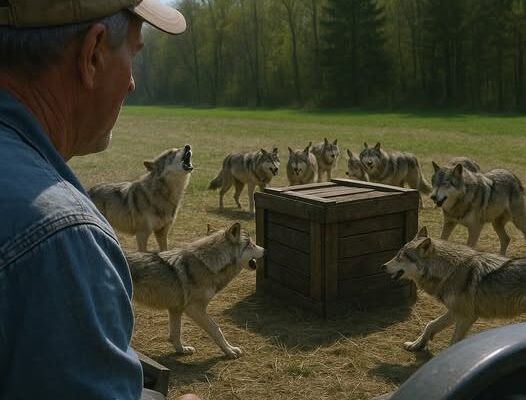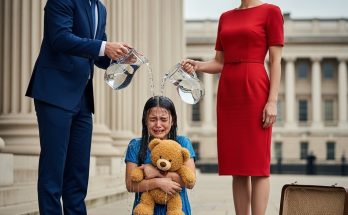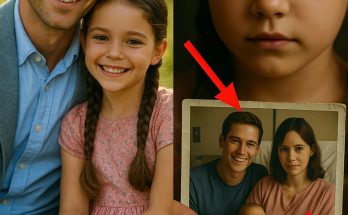A few years ago, in the quiet farmlands of Iowa, a story unfolded that stunned the nation. Some called it a miracle, others called it unbelievable, and many argued over what it revealed about humanity itself. Were the wolves the beasts in this tale—or the humans who abandoned their own flesh and blood?
It all began on a crisp spring morning. Farmers were back in the fields after a brutal winter, preparing the soil for planting season. Among them was Jack, a weathered man in his forties with rough hands, a steady heart, and a deep love for his family. Out in the countryside, he found peace—the wide sky, the smell of earth, and the quiet rhythm of the land.
That day, Jack was plowing the outer edge of a field bordering the woods. As his old tractor chugged along, a strange sound cut through the steady rumble. At first he thought it was wind, but then it came again—long, mournful howls. Wolves.
He frowned. Wolves weren’t common in Iowa, and they certainly didn’t make themselves known in broad daylight. Jack stopped the tractor, climbed down, and listened. The cries grew louder until he spotted them—a pack of gray wolves in a small clearing, circling something on the ground.
It wasn’t prey. It wasn’t a kill. It was a wooden crate, battered and half-buried in weeds. The wolves paced around it, howling, scratching at the boards, as if trying to draw attention.
Jack’s stomach turned. Wolves didn’t act like this. He grabbed a crowbar from the tractor and approached carefully, expecting aggression. But instead of attacking, the wolves slowly retreated into the trees, leaving the clearing to him.
As he neared the crate, he froze. From inside came a faint, fragile sound—crying.
With shaking hands, Jack pried the boards loose. The wood cracked and splintered, and then his breath caught in his throat.
Two infants.
Tiny twins lay bundled in filthy rags, their faces blotchy from the cold, their fists trembling as they whimpered. They couldn’t have been more than six months old. Jack staggered back, then dropped to his knees, gently lifting them out. Their skin was icy. Their clothes damp. Without the wolves, without this moment—he didn’t want to finish that thought.
“Who would do this?” he whispered, tears stinging his eyes. One of the babies blinked at him, weakly smiling through the shivers. Jack pulled them against his chest, wrapping them in his jacket, whispering, “You’re safe now.”
He raced the tractor toward town, holding the twins close. At the clinic, nurses rushed to save them. The sheriff was called, and soon the whole town buzzed with the unbelievable story. At first, deputies doubted the part about wolves—until they saw the paw prints surrounding the crate.
The investigation revealed a heartbreaking truth. The twins’ mother, overwhelmed and unstable, had abandoned them with her boyfriend’s help. They thought leaving the babies in a crate in the woods was “safe” until someone came along. But it was only chance—or fate—that wolves had found them first.
That night, Jack went home and hugged his own children tighter than ever. But he couldn’t stop thinking about those babies. Weeks later, after long talks with his wife, they made a life-changing decision: they adopted the twins.
What started as tragedy became an act of love. The children grew up with a family, and as they got older, Jack shared the story of how wolves—the very creatures so often feared—were the ones who saved them.
Whenever Jack heard a distant howl in the fields, he would smile and whisper his thanks. Because in the end, it wasn’t the wolves who showed cruelty—it was the humans who abandoned their young. The wolves had only shown mercy.



